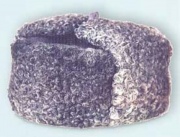Difference between revisions of "Astrakhan"
Jump to navigation
Jump to search
(username removed) |
|||
| (3 intermediate revisions by 3 users not shown) | |||
| Line 2: | Line 2: | ||
== Description == | == Description == | ||
| − | Tightly curled, black fur obtained from the fleece of young or stillborn lambs of [ | + | Tightly curled, black fur obtained from the fleece of young or stillborn lambs of [[karakul|karakul]] sheep native to the Lake Kara Kul region of Uzbekistan. The highly valued karakul lamb pelt is removed shortly after birth. A broadtail pelt, which is softer and silkier, is obtained from a still-born lamb. Imitation astrakhan is called astrakhan cloth and was originally made in Russia. It is a inexpensive woolen fabric made by heat-treating pile yarn to produce helical coils. Astrakhan fur and astrakhan cloth are used for lining and trimming coats, caps, and muffs. |
== Synonyms and Related Terms == | == Synonyms and Related Terms == | ||
| − | astrakhan cloth; astrachan; karakul; Persian lamb; broadtail; Swakara (Southwest African karakul); | + | astrakhan cloth; astrachan; karakul; Persian lamb; broadtail; Swakara (Southwest African karakul);astracán(Esp.) |
| − | == | + | ==Resources and Citations== |
| − | * | + | * Rosalie Rosso King, ''Textile Identification, Conservation, and Preservation'', Noyes Publications, Park Ridge, NJ, 1985 |
| − | * | + | * Random House, ''Webster's Encyclopedic Unabridged Dictionary of the English Language'', Grammercy Book, New York, 1997 |
* ''Fairchild's Dictionary of Textiles'', Phyllis G.Tortora, Robert S. Merkel (eds.), Fairchild Publications, New York City, 7th edition, 1996 | * ''Fairchild's Dictionary of Textiles'', Phyllis G.Tortora, Robert S. Merkel (eds.), Fairchild Publications, New York City, 7th edition, 1996 | ||
| Line 18: | Line 18: | ||
* ''The American Heritage Dictionary'' or ''Encarta'', via Microsoft Bookshelf 98, Microsoft Corp., 1998 | * ''The American Heritage Dictionary'' or ''Encarta'', via Microsoft Bookshelf 98, Microsoft Corp., 1998 | ||
| − | * | + | * Edward Reich, Carlton J. Siegler, ''Consumer Goods: How to Know and Use Them'', American Book Company, New York City, 1937 |
| − | * | + | * Facts on Furs - Karakul from www.iftf.com/facts_karakul.asp |
| − | * | + | * Meredith Montague, contributed information, 1998 |
[[Category:Materials database]] | [[Category:Materials database]] | ||
Latest revision as of 13:13, 30 April 2022
Description
Tightly curled, black fur obtained from the fleece of young or stillborn lambs of Karakul sheep native to the Lake Kara Kul region of Uzbekistan. The highly valued karakul lamb pelt is removed shortly after birth. A broadtail pelt, which is softer and silkier, is obtained from a still-born lamb. Imitation astrakhan is called astrakhan cloth and was originally made in Russia. It is a inexpensive woolen fabric made by heat-treating pile yarn to produce helical coils. Astrakhan fur and astrakhan cloth are used for lining and trimming coats, caps, and muffs.
Synonyms and Related Terms
astrakhan cloth; astrachan; karakul; Persian lamb; broadtail; Swakara (Southwest African karakul);astracán(Esp.)
Resources and Citations
- Rosalie Rosso King, Textile Identification, Conservation, and Preservation, Noyes Publications, Park Ridge, NJ, 1985
- Random House, Webster's Encyclopedic Unabridged Dictionary of the English Language, Grammercy Book, New York, 1997
- Fairchild's Dictionary of Textiles, Phyllis G.Tortora, Robert S. Merkel (eds.), Fairchild Publications, New York City, 7th edition, 1996
- The American Heritage Dictionary or Encarta, via Microsoft Bookshelf 98, Microsoft Corp., 1998
- Edward Reich, Carlton J. Siegler, Consumer Goods: How to Know and Use Them, American Book Company, New York City, 1937
- Facts on Furs - Karakul from www.iftf.com/facts_karakul.asp
- Meredith Montague, contributed information, 1998
